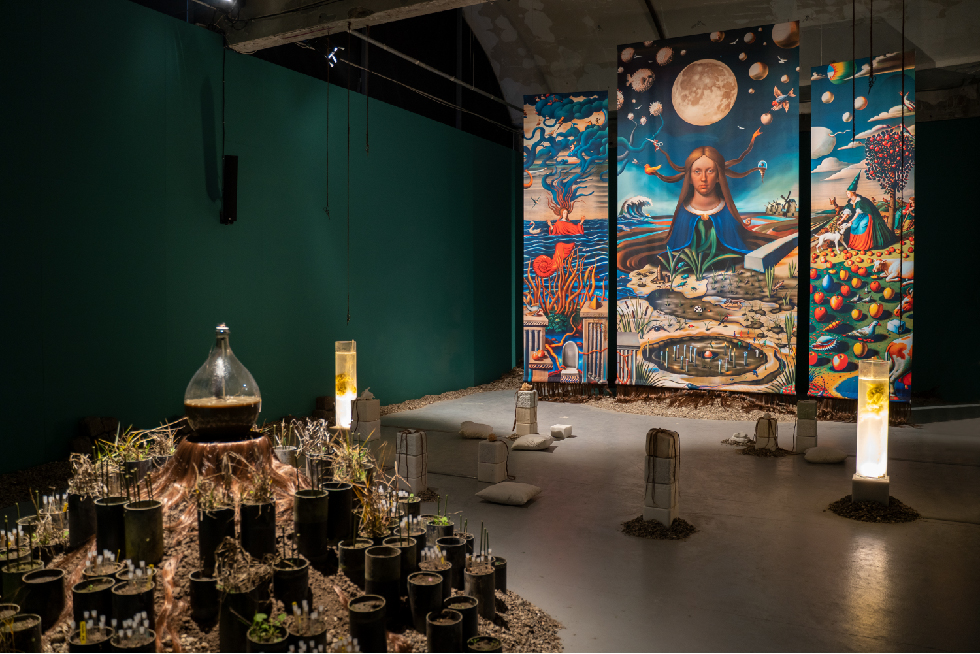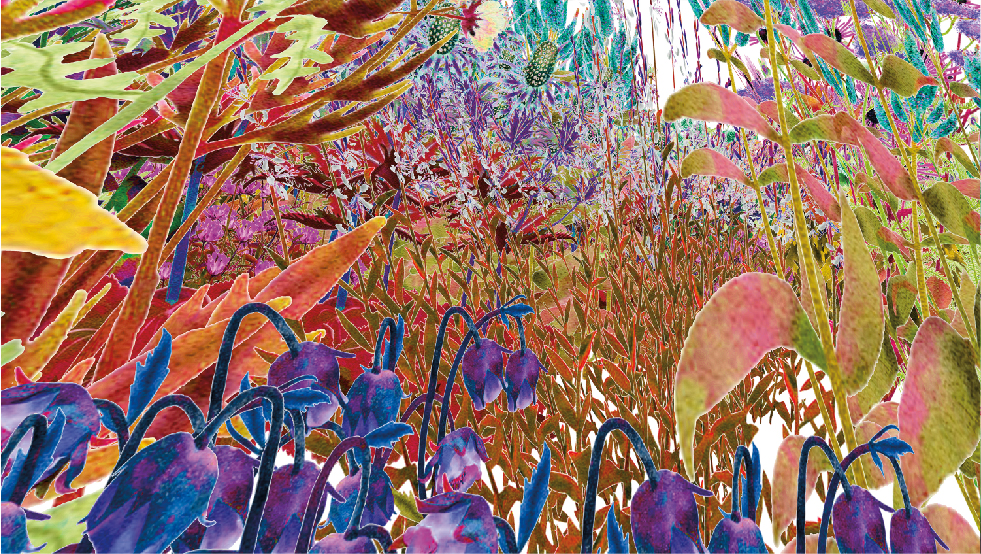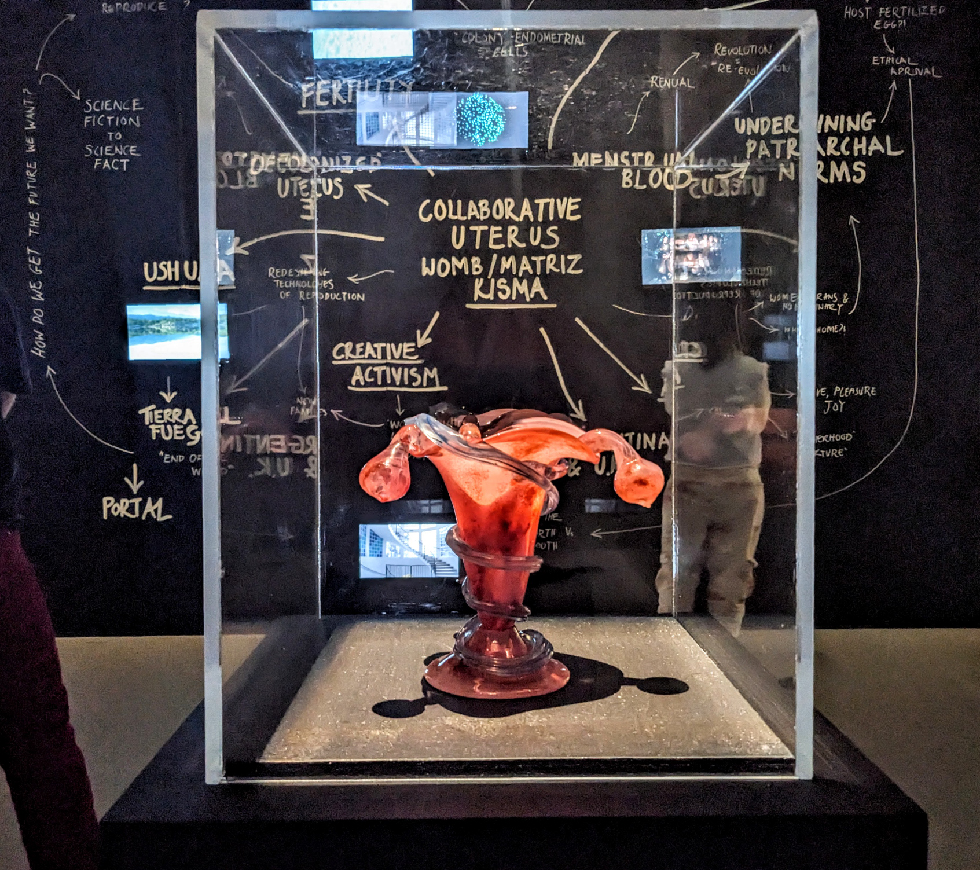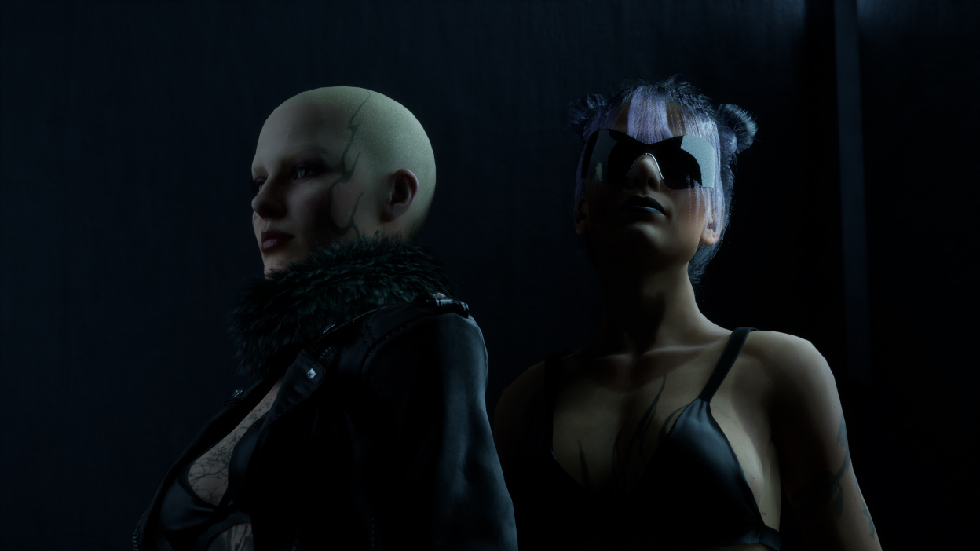- This event has passed.
鎧美拉之島CHIMERA ISLAND 臺北數位藝術節 Taipei Digital Art Festival
8 11 月, 2024 @ 12:00 下午 - 17 11 月, 2024 @ 7:00 下午

第19屆臺北數位藝術節11月2日於臺灣當代文化實驗場C-LAB登場,由獨立策展人陳湘汶和顧廣毅共同策劃,集結了國內4組、國際12組藝術家,共計21件跨域、混種的藝術作品。展覽以「鎧美拉之島」為名,用神話中同時擁有獅身、羊頭、蛇尾的噴火獸-鎧美拉(Chimera)一詞出發,比喻社會機制和各項科技就像是不同功能的器官,嵌合並運作成理想的鎧美拉,透過多樣化的藝術作品,與觀眾共同思考人類和科技之間更加有機的關係。
展覽以C-LAB美援大樓展演空間為室內主展場,在這棟兩層樓高的歷史建物,策展脈絡的兩大軸線於此交錯,第一個軸線是以「器官學」(Organology)一詞作為本策展企劃的概念延伸;第二個軸線則是把「推測」(Speculation)與「虛構」(Fiction)當作方法去勾勒科技與人類的交錯混種,並嘗試從中窺視隱藏其中的倫理爭議與文化問題。為了引導觀眾進入「鎧美拉之島」的展覽敘事,策展人特別將美援大樓兩層樓分別規劃出截然不同的調性。
The 19th Taipei Digital Art Festival will launch on November 2 at the Taiwan Contemporary Culture Lab (C-LAB), curated by independent curators Chen Hsiang-wen and Ku Kuang-yi. The festival brings together 21 interdisciplinary, hybrid artworks created by four Taiwanese and twelve international artists. Titled Island of Chimera, the exhibition draws from the mythical creature Chimera—characterized by its lion’s body, goat’s head and serpent’s tail—to symbolize societal mechanisms and various technologies as interlocking organs functioning together as an ideal Chimera. Through a diverse range of artworks, the exhibition invites audiences to consider a more organic relationship between humanity and technology.
This year’s Taipei Digital Art Festival, themed “Chimera Island”, uses the U.S. Aid Building at C-LAB as the main indoor exhibition venue. The exhibit is organized around two curatorial concepts: the first axis extends the idea of “Organology” (the study of organs) as a framework, while the second axis explores “Speculation” and “Fiction” to examine the intersections of technology and humanity, revealing hidden ethical and cultural issues. Curators have tailored each of the U.S. Aid Building’s two floors to convey unique atmospheres and lead visitors into the narrative of “Chimera Island”.

荷蘭藝術團體Nonhuman Nonsense作品《泥巴與洪水 – 妮海蓮娜的歸來》©Nonhuman Nonsense。
神秘黑盒—探討個體與社會集體的意識對話 The Black Box of Individual and Collective Consciousness
具有神祕黑盒子氛圍的一樓展區,作品主題圍繞在探討精神性或神話內容,延伸到個體與社會集體的意識對話。如藝術家詹宏祿的作品《與內在外星人的親密接觸》,其建構了一個過渡空間,呈現人類集體意識和AI資料庫互動後的外星人形象,邀請觀眾共同欣賞他人的內在外星人,藉此反思自身對於未知他者的認知偏見;而在《泥巴與洪水 – 妮海蓮娜的歸來》作品中,以荷蘭為基地的藝術團體Nonhuman Nonsense復活了古老的海洋女神妮海蓮娜,讓祂以21世紀的全新形象出現,融合了科學與神話,迫使我們在氣候變遷的環境下,重新審視與非人類生物與自然力量的整體關係;英國藝術家夏洛特.賈維斯(Charlotte Jarvis)的《激進照護器官:一個集體子宮》為藝術與科學跨界的實踐性計畫,企圖從多名女性、跨性別者和非二元性別人士自願提供的細胞中培育出子宮,反映了科技藝術對跨界、性別議題發展的關心。
The first floor has a black-box aesthetic, focusing on themes of spirituality and mythology, exploring the dialogues between individual and collective consciousness. For example, artist Chien Hung-Lu’s Close Encounters with Inner Aliens constructs a transitional space that reflects interactions between the collective human consciousness and AI databases, creating alien forms that reflect human biases toward the unknown. The Dutch artist group Nonhuman Nonsense presents Mud and Flood – The Return of Nehalennia, reimagining the ancient ocean goddess in a 21st-century light to prompt reflections on humanity’s relationship with non-human life and natural forces in an era of climate change. British artist Charlotte Jarvis’s Radical Care Organ: A Collective Womb is an artistic-scientific project aiming to create a womb from cells provided by women, trans and non-binary volunteers, bridging art and science to explore gender and technology issues.

英國藝術家Alexandra Daisy Ginsberg的作品《授粉者的路徑創造者》
Pollinator Pathmaker in Pollinator Vision, 2023. © Alexandra Daisy Ginsberg Ltd. Courtesy of the artist.
互動體驗—挑戰科技發展對人類社會的影響 Interactive Experiences and the Impact of Technology on Society
走進二樓展區,更加強調的是與觀眾的互動體驗,展現藝術家如何用作品呈現人在網路中的自我關係,讓觀眾以不同於平常習慣的視角來思考,或挑戰科技發展對人類社會的影響。如英國藝術家亞歷姍卓・金斯柏(Alexandra Daisy Ginsberg)的作品《授粉者的路徑創造者》,透過互動讓參與者打造一個從授粉者生物角度設計的花園,其目的是改變我們看待花園的方式,以及探索我們為誰建造花園;而以疫後成為常態的視訊會議為靈感《一場煩蛋的視訊會議》,是藝術家吳權倫挪用視訊的經驗,以非人觀點去思考,我們觀察自然的行為對於非人生物來說何嘗不是一種社交尷尬?就像我們在視訊會議中不小心窺見他人隱私空間一樣。新銳藝術團體XTRUX為展覽新作的《黑色博物館》,展覽形式包括立體雕塑及遊戲引擎打造之即時遊戲,揉合影像及空間建構大型空間裝置,思慮感知中虛擬與現實的交互辯證。
The second floor emphasizes interaction, challenging visitors to rethink the influence of technology on human society. British artist Alexandra Daisy Ginsberg’s Pollinator Pathmaker encourages participants to create a pollinator-friendly garden, rethinking garden design from a non-human perspective. Wu Chuan-Lun’s A Boring Video Meeting, inspired by the post-pandemic era of video calls, reinterprets virtual social spaces from a non-human viewpoint, exploring the shared awkwardness of online interactions. New art collective XTRUX presents The Black Museum, a large-scale installation blending virtual and physical realities through real-time gaming and sculpture, provoking a dialectic on virtual versus tangible experiences.

Charlotte Jarvis英國藝術家《激進照護器官:一個集體子宮》
©Charlotte Jarvis。

新銳藝術團體XTRUX為展覽新作的《黑色博物館》。
跨域合作—未來廣場科技互動與藝術共演 Outdoor Collaboration – Interactive Technology and Art Performances at Future Plaza
本次臺北數位藝術節特別增設了戶外展區,互動作品《如何(不)被自動駕駛車輛撞擊》由藝術家木原共Tomo Kihara和Daniel Coppen共同創作,在未來廣場上設置一條挑戰人工智慧的遊戲賽道,歡迎觀眾嘗試在不被AI辨識發現的情況下抵達終點,藉由互動誘發大眾思考自動駕駛系統的潛在危險;廣場上同時與NFT社群「眾聲道VolDAO」合作,展出多樣豐富的生成式藝術品,向觀眾展現充滿活力與跨域合作的藝術面貌。
活動期間除了上述作品常態展出外,戶外同時用「異質組裝」的精神搭建成舞台,藉以回應本次「鎧美拉之島」的主題,於C-LAB未來廣場上安排兩場戶外演出,11/2開展日19至21時在未來廣場邀請臺灣三位表演者共演現代特技與跨界馬戲,11/15閉幕節目18至21時在未來廣場邀請日本雙人組高橋啓治郎(Keijiro Takahashi)&首藤陽太郎(Yotaro Shuto)、韓國雙人組oOps.50656、義大利籍藝術家盧卡(Luca Bonaccorsi)與臺灣多位藝術家連袂演出,不僅藝術展演本身富有跨域、幻想的特質,也希望用多元迷人的演出吸引更多不同參觀群眾,豐富本次及未來的臺北數位藝術節。
This year’s festival includes an outdoor section. How (Not) to Get Hit by a Self-Driving Car, created by Tomo Kihara and Daniel Coppen, invites visitors to navigate an AI-monitored race track, exploring the risks of automated systems. The NFT community VolDAO showcases generative art pieces to highlight the vitality of interdisciplinary collaboration in digital art.
In addition to the exhibits, two outdoor performances are scheduled at Future Plaza, embodying the festival’s “Chimera” theme with diverse artistic expressions. The opening performance on November 2 features contemporary acrobatics and circus acts by three Taiwanese performers, while the November 15 closing program includes collaborations between Japanese artists Keijiro Takahashi & Yotaro Shuto, Korean duo oOps.50656, Italian artist Luca Bonaccorsi, and several Taiwanese artists, offering a fusion of fantasy and cross-disciplinary art to engage diverse audiences.
臺北數位藝術節 Taipei Digital Art Festival —鎧美拉之島 CHIMERA ISLAND
日期 Date:11/02(六 Saturday)至11/17(日 Sunday) 週一不開放 closed Mondays
時間 Time:12:00-19:00
地點 Venue:臺灣當代文化實驗場C-LAB Taiwan Contemporary Culture Lab (C-LAB)(美援大樓展演空間&未來廣場)
官網 Website:https://festival.dac.taipei/

